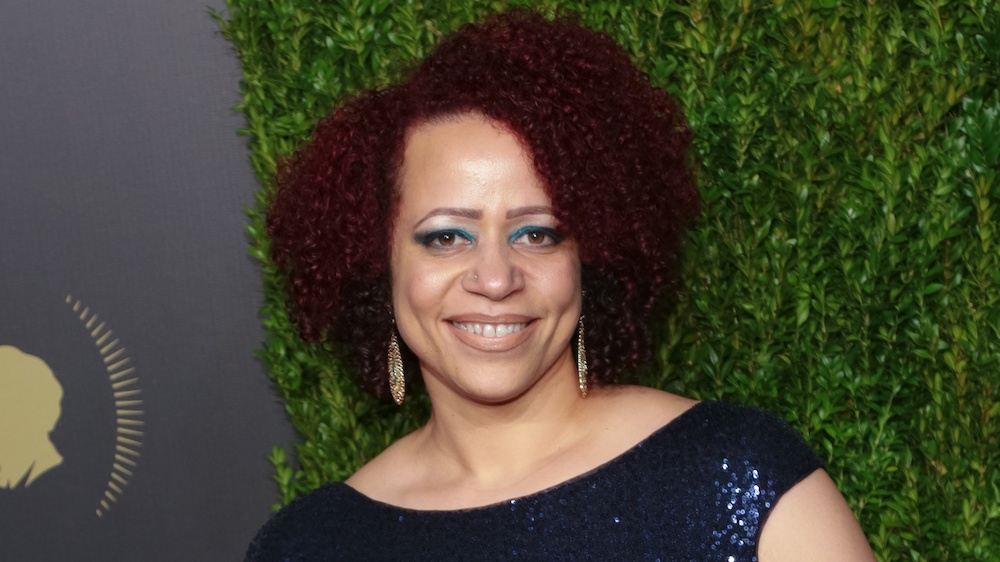If you’re interested in sharing your opinion on any cultural, political or personal topic, create an account here and check out our how-to post to learn more.
Opinions are the writer’s own and not those of Blavity's.
____
The announcement that Nikole Hannah-Jones would be taking up a position at Howard University after being offered a tenured position at UNC was the plot twist no one saw coming. Her decision is a masterclass to Black women in standing in your power and purpose. Her example shows that we do not have to remain in spaces where we are not valued. Refusing to engage in systems rigged for us to fail is a viable and potentially life-saving option.
The debacle of Hannah-Jones’ tenure appointment will resonate with many Black women who have had to navigate elite institutions. Often, there is an ugly dynamic where Black women are made to feel grateful simply for being allowed to take up space. The subtext is that our years of hard work and experience do not count. It takes a huge emotional and cognitive toll to navigate a workplace that often feels like it was structured for you to fail. You develop a kind of hyper-awareness about every interaction, constantly evaluating yourself. Did I voice that dissenting opinion too forcefully? Did I forget to add a smile before asking for that report? Was my tone of voice just the right shade of unthreatening? Refusing to engage in a game that could be ruining your wellbeing is not a weakness but a sign of courage.
Hannah-Jones's rejection of UNC's offer also highlights how institutions look to launder their reputation by appointing a Black person to a prominent position — in the hopes that no one looks too closely at the actual lived experiences of the people of color who occupy those positions. Quite simply, UNC knew they had done wrong, yet looked to Hannah-Jones to paper over the situation by accepting the job they had grudgingly offered only after being dragged in the national media. It is 2021, and Black women should not be burdened with the emotional labor of cleaning up messes they did not create, to make things whole after being wronged.
Hannah-Jones said it best in her public statement: “For too long, powerful people have expected the people they have mistreated and marginalized to sacrifice themselves to make things whole. The burden of working for racial justice is laid on the very people bearing the brunt of the injustice, and not the powerful people who maintain it. I say to you: I refuse.”
Institutions must be willing to do the hard work of uprooting systemic racism if we are to have the honest racial reckoning that so many committed after last year. Turning to black people to repair the systems causing them harm does not cut it anymore.
While many will recognize the lesson in Hannah-Jones' experience, some might point to her high profile and many backup options as evidence of why her example does not apply — that Black women do not have the power to avoid these elite institutions. There was a power dynamic at play in the controversy over Hannah-Jones' tenure. UNC is an elite and prestigious institution, backed by wealthy conservative donors keen to push an agenda. Hannah Jones also understood her power. In addition to her national profile, she had support from the UNC student body and her fellow faculty members. By waiting to reject the job only after UNC had made the offer, Hannah-Jones got the University to admit she was owed the job and should never have been subjected to the public debate.
There was a significant asymmetry of power; however, Hannah-Jones leveraged her setback into a tenured position at Howard University while also securing $20 million in grant money. In contrast, UNC has suffered substantial reputational damage by showing itself to be an institution beholden to wealthy donors that are not afraid to stifle academic freedom.
When I first heard about the UNC Board of Trustees' decision to deny Hannah-Jones tenure, I felt the familiar sinking feeling of seeing yet another injustice towards a talented Black woman playing out on the national stage. Between Simone Biles being judged by a different standard because of her dominance, to the misogynistic whisper smear campaign against Vice President Harris, it’s been a lot. We’ve been sent a message that our accomplishments and hard work are somehow never enough. So I was happy to see an example of a Black woman call time on the disrespect and opt out of an environment hellbent on devaluing her talents.
Walking away from harms perpetrated by powerful institutions takes courage, a shrewd understanding of power dynamics and, most importantly, knowing your worth. May we all find the strength and courage to declare “I refuse.”
